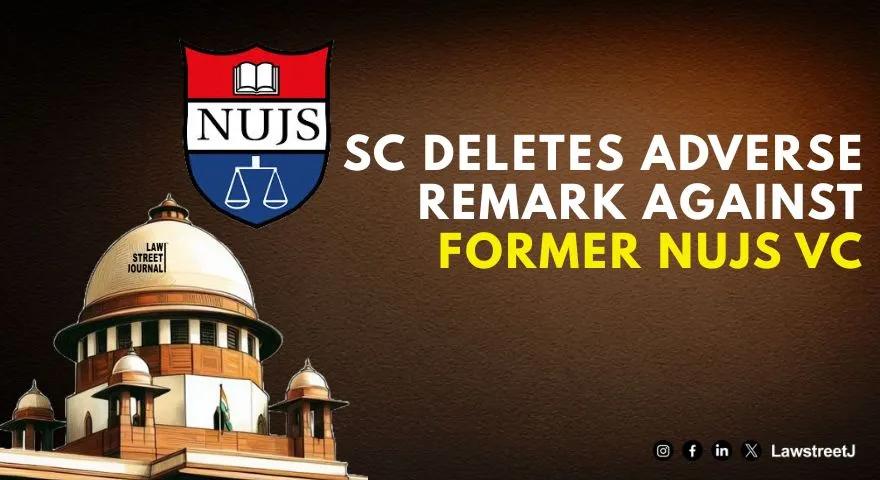New Delhi: The Supreme Court has deleted an adverse observation against Professor Nirmal Kanti Chakrabarti, former Vice-Chancellor of the West Bengal National University of Juridical Sciences, from its earlier judgment, holding that casting stigma through adverse remarks amounts to punishment without a finding of guilt on merits.
Justice Pankaj Mithal, writing for a two-judge bench also comprising Justice Prasanna B. Varale, allowed the application seeking expunction of a specific sentence from paragraph 34 of the Court’s judgment dated September 12, 2025, in Civil Appeal No. 11786 of 2025, titled “Vaneeta Patnaik vs. Nirmal Kanti Chakrabarti & Ors.”
The Court was hearing a Miscellaneous Application arising from Diary No. 54540/2025 filed by Professor Chakrabarti, seeking deletion of paragraphs 33 and 34—particularly the sentence beginning with “Thus” and ending with “personally” in paragraph 34 of the earlier judgment.
Dr. Abhishek Manu Singhvi, Senior Advocate appearing for the applicant, submitted that since the applicant had not been held guilty, “casting a stigma, as referred to in the above sentence, amounts to a punishment without holding him guilty of any misconduct or offence.”
Opposing the application, Ms. Meenakshi Arora, Senior Advocate for the appellant, argued that the application was not maintainable and that the proper remedy lay in filing a review petition. She contended that “the Court had incorporated the sentence with a conscious mind, and there is no reason to expunge the same.”
Dr. Singhvi and Ms. Madhavi Divan, Senior Advocate, clarified that the applicant was not seeking a review of the judgment but only expunction of a stigmatic observation, making the miscellaneous application the appropriate remedy.
The Supreme Court declined to examine the maintainability issue, stating: “We do not intend to enter into the question of maintainability of the application. However, treating it to be a miscellaneous application or a review application, as the case may be, we proceed to decide the same.”
On merits, Justice Mithal acknowledged the Court’s original intention: “The intention of the Court in adding the above sentence was only to apprise the public with regard to the incident which had taken place involving the applicant/respondent.”
However, the Bench recognized the impropriety of making such an observation without a finding of guilt: “But nonetheless, as there is no finding on merits against him, we consider it appropriate to delete the same, as probably the incident is under investigation/trial pursuant to an FIR.”
The Court’s operative conclusion stated: “We delete the aforesaid sentence beginning from ‘Thus’ and ending with ‘personally’ contained in paragraph No. 34 of the judgment and order dated 12.09.2025, for the reason that we have not indicted the applicant/respondent on merits in any manner, though the matter may have been argued on merits.”
This ruling establishes the important principle that courts cannot cast aspersions or stigma on individuals through adverse observations in judgments when no finding of guilt or misconduct has been recorded. Such remarks—even if intended for public awareness—amount to punishment without adjudication and violate principles of natural justice.
The distinction drawn by the Court that “the matter may have been argued on merits” but “we have not indicted the applicant/respondent on merits” underscores that allegations or submissions are not equivalent to judicial findings.
The order also implicitly recognizes that adverse judicial observations can have serious professional and reputational consequences, particularly for academics and public office holders, and therefore must be made only when supported by findings on merits after due process.
The application (I.A. No. 242096/2025) was allowed, and the miscellaneous application was disposed of accordingly.
Case Title: Vaneeta Patnaik vs. Nirmal Kanti Chakrabarti & Ors.













